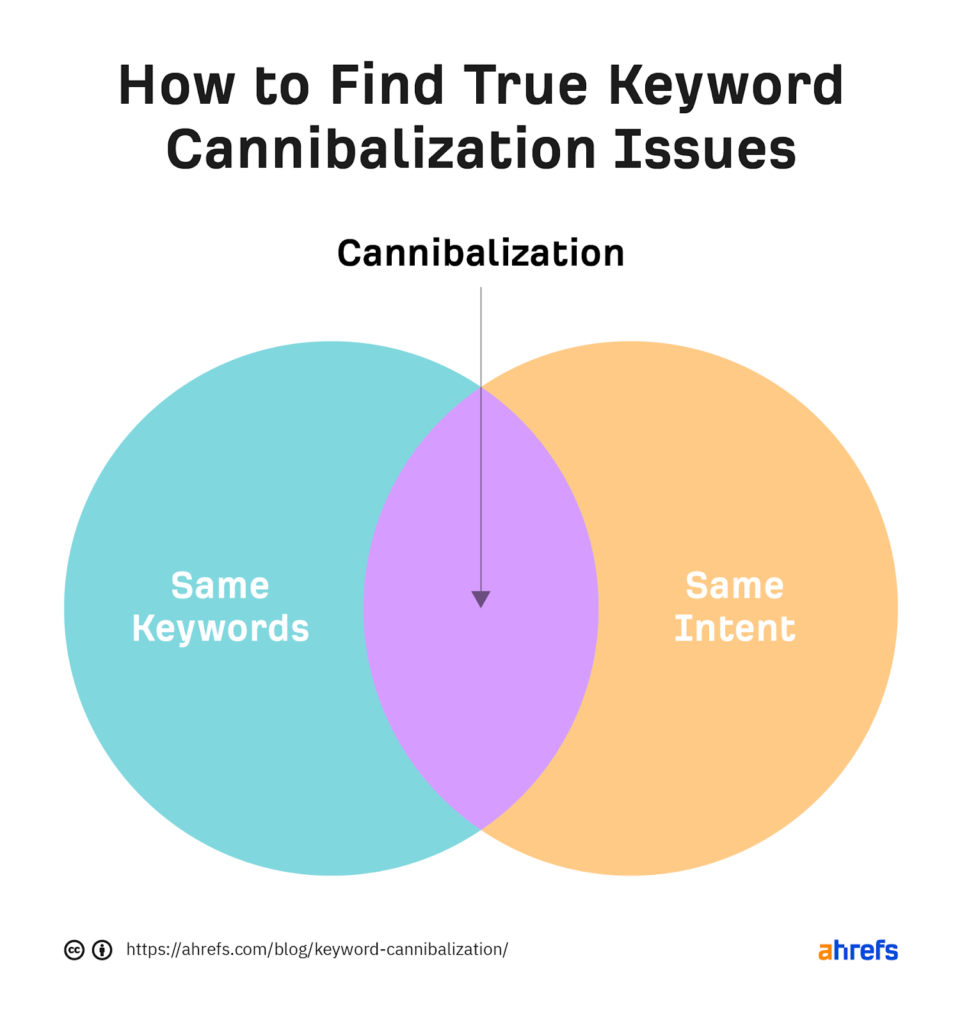To rank their content higher in search results, most digital marketing teams rely on keyword optimization. More keywords, the theory suggests, equals greater optimization. As a result, it can be tempting to repeat keywords across numerous pages in order to boost your position. After all, the more pages you have in the search results, the more search users will see them, right?
Regrettably, this is not always the case.
Using many pages to target a single term can have the opposite effect. You can end up hurting your SEO for that keyword more than helping it. The explanation for this is simple: when numerous pages rank for the same keyword, they are forced to compete with one another. As a result, each page has a lower CTR, poor authority, and dismally low conversion rate than a single unified page would.
What is Keyword Cannibalization?
If you optimize numerous pages on your site for the same search query, you’re essentially competing with yourself, which can cause all of your sites to rank poorly. Keyword cannibalization is what we call it when this happens.
Looking for pages that target the same keywords and meet the same or very similar intent is the key to detecting true keyword cannibalization.

The term “keyword cannibalization” comes from the fact that you’re “cannibalizing” your own results by dividing CTR, links, content, and consequently, conversions across two sites that should be one. You aren’t displaying to the search engines the range or depth of your expertise nor are you increasing your site’s authority for that inquiry. Instead, you’re asking Google to compare your pages to one another and pick the one that best matches the relevant keywords.
Let’s imagine your website sells tracksuits and [tracksuits] is the only keyword you want to rank for. You’re basically telling Google that every page is about tracksuits, whether they’re hiking tracksuits, athletics tracksuits, casual wear, or something else altogether. You’re competing against yourself for one phrase that may be too wide to have commercial intent, rather than profiting on longer-tail keywords like women’s tracksuits, running tracksuits, and so on.
4 Ways in Which Keyword Cannibalization is Killing Your SEO
Keyword Cannibalization is a silent killer of your SEO efforts mainly because most webmasters may not be aware of its presence. They may even be content with one page being in, say, the seventh and eighth positions fulfilling their ranking goal, despite the fact that one authoritative website would likely rank higher and convert better.
Let us now look at four of the ways in which keyword cannibalization is killing your SEO:
1. By weakening the page’s authority
Due to intentional or unintentional keyword cannibalization, you’ve effectively turned your pages into competitors, and the battle for pageviews and SERP ranks has begun. The result is you’re spreading your CTR across numerous marginally relevant pages, rather than having one highly authoritative page.
Drawing parallels, consider this situation of learning a certain technology. Would you prefer to learn from one comprehensive and authoritative source, like a complete reference book, or an all-inclusive website? Or would you favour learning from 3-4 books or websites that are incomplete and unnecessarily overwhelm you?
2. By making the Search Engine give a more relevant page less value and vice versa
One of the most important ways we help search engines understand what our pages are about is by using keywords. If all of your keywords are the same, a search engine like Google will try to figure out which page is the best match – and if your content is too similar, it may make a mistake.
Let’s imagine you have two pages that are ranking for the same keyword. You may be missing out on high-value, converting traffic if the higher converting page ranks lower.
3. By weakening your anchor text and links
Backlinks that could have gone to a single centralized source of information are now spread among two (or more) pages. The time and effort spent obtaining 10 links for one page and 15 links for another could have been better spent acquiring 25 links for a single page that performed better.
A substantial, in-depth page is also more likely to get linked to than a lighter, less comprehensive one. Similarly, instead of pointing readers to a single authoritative page on the subject, your anchor text and internal links direct them to several pages, thus, substantially weakening your SEO efforts and organic traffic.
4. By having a detrimental impact on your conversion rate
One of your pages will invariably convert better than the others. You’re losing prospective leads instead of guiding new visitors to that page and making it the most authoritative page possible.
Although keyword cannibalization kills your SEO, there are several ways in which you can bring your SEO back to life. Let’s now discuss the methods of fixing keyword cannibalization.
Fixing Keyword Cannibalization
Change the optimization settings if numerous pages are ranking for the same keyword and search query. This could imply a reduction in keywords, a change in keywords, finding new keywords, creating new landing pages, or a reorganisation of the content. Let us describe each strategy one by one:
1. Consider removing some parts of your posts
When it comes to keyword cannibalization, simply re-optimizing posts isn’t always enough. Consider eliminating part of the overlapping content in such a situation. If, however, two posts generate decent organic traffic and business leads, instead of cutting down, consolidate your content by merging the posts.
2. Reorganize your pages
Take your most authoritative page and turn it into a landing page that links to additional unique versions that fit within the scope of your targeted keywords. This is one of the simplest approaches to fix keyword cannibalization.
3. Create a brand new landing page
You may be missing a landing page that brings all of your product pages together in one location. Create a singular landing page to serve as your authoritative source page in this situation, and link to all of your variations from there. This strategy will allow you to target both broad keyword terms and long-tail keywords on your consolidated pages and variations.
4. Merge your content
Consider consolidating your pages into one if they aren’t unique enough to merit having many pages targeting the same keyword. This is an opportunity to transform two underperforming pages into a more authoritative source. It could also help with concerns like thin content.
Begin by looking at your analytics to see which page has the best traffic, bounce rate, time on page, conversions, and so on. You may discover that one page receives the majority of traffic, yet the information on the other converts more users.
In this situation, the goal could be to consolidate the converting copy content on the most visited page. In an ideal situation, you’d be able to keep your ranking and convert more of the traffic.
Another advantage of this strategy is that you won’t have to worry about your website being penalized because of thin content.
Preventing Keyword Cannibalization
“Prevention is always better than cure”.
Detecting keyword cannibalization and fixing it, as we’ve already seen, is possible, but it’s always better to prevent the problem than to remedy it. Let us see a few ways of doing it.
1. Hone your targeted keyword strategy
Creating a targeted keyword strategy, which eliminates competition and unwanted overlap, is one of the greatest strategies to avoid keyword cannibalization.
In a nutshell, this entails optimizing various pages for various keywords and search queries.
2. Keep tabs on your keyword rankings and performance
It’s not enough to just have a keyword strategy. You must also track the performance of the keywords you wish to work with over time once you’ve identified them.
Tracking keyword statistics on a regular basis can help you figure out which keywords are ranking, which have too much competition, which are at risk of cannibalization, and which require a fine tuning.
3. Focus more on creating quality content first
When marketing teams grow more focused on optimizing keywords than developing quality content around important themes, the chances of the occurrence of keyword cannibalization becomes high.
If you’re chasing keywords, there’s a good possibility you’ll overlook content themes and its quality, which can hinder your progress towards your marketing objectives.
Rather than devoting all of your resources to keyword research, make it a part of your marketing strategy to concentrate on relevant topics and quality content.
4. Perform Content Audits regularly
Once you’ve created a good keyword strategy, set up tracking tools, and increased your focus on audience interest topics, your final duty is to do regular content audits to ensure that what you’re posting remains relevant to your readers’ interests and marketing objectives.
Certain topics may become irrelevant with time, while some may become outdated. Even the statistics tend to change. Your topics and keywords, therefore, must meet your marketing goals in a timely manner, and that calls for regular content audits.
Final Takeaways
Ranking several pages for the same keywords and search queries is detrimental to your SEO efforts. It leaves you no choice than to compete with yourself, thus reducing your chances of marketing success considerably.
On the other hand, focusing on targeted keywords for particular content, prioritizing topics over keyword stuffing, and constructing extensive landing pages, not only prevents keyword cannibalization, but also improves your search engine results page ranking and, as a result, your organic reach.
Even if you’ve already encountered keyword cannibalization, rethink your optimization strategies, eliminate posts that result in competition with one another. Also merge different content that ranks well separately into one authoritative post or landing page.
By addressing keyword cannibalization and refining your content strategy, you can significantly enhance your SEO performance and organic reach. If you’re ready to elevate your online presence and need expert guidance, explore our organic marketing services in the Philippines. Let us help you optimize your strategy and achieve sustainable growth. Contact us today to start transforming your SEO approach!






